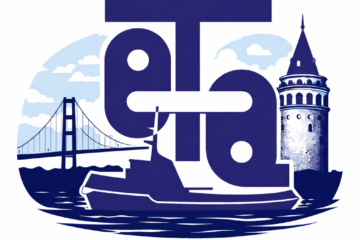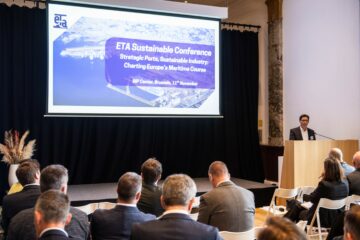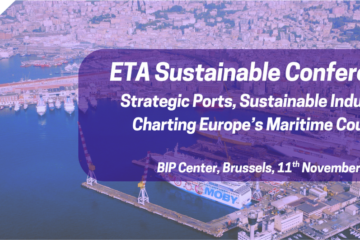
ETA took the opportunity of the 3rd European Shipping Week to discuss the diverse approaches to the necessary efforts to reduce shipping emissions. The event “50 shades of Green” was the perfect occasion to discuss the future of shipping and the steps the sector must take to reduce its emissions amongst different stakeholders.
ETA Chairman, Kimmo Lehto, welcomed all attendants and speakers and underlined the big efforts the sector is making to reduce emissions. In fact, ETA members are in the industry´s vanguard when it comes to adopting green solutions and low emissions technologies.
The panel, moderated by Florence Ranson brought together 4 speakers representing different sectors that will play an essential role in greening the shipping industry, plus a EU Commission official who outlined the EC policies and actions to assist the sector in its decarbonization objectives.
Christophe Tytgat, Secretary General of the European Shipyards & Maritime Equipment Association opened the floor underlining the considerable challenge the European Green Deal will pose and how it can become the perfect opportunity to develop a sustainable and competitive shipping sector. This opportunity can only be fully exploited if there is enough public funding to further the research of innovative solutions. This is especially relevant when it comes to the supply and development of alternative fuels as they still require more R&D funding to reach the right level of technological maturity. Thus, Mr. Tytgat asked for the right legislation to be adopted, a legislation that should provide legal certainty and not impose any technological solution, plus, the necessary financial stimulation to make technical progress faster. Moreover, Mr. Tytgat demanded the application of the right trade defence instruments and legislation to enforce the Green Deal properly. This is especially important when it comes to trading with third parties that could take advantage of their lower environment standards or different state aid rules.
Barbara Jinks, Director Government Relations at Gas Infrastructure Europe analysed the important role LNG is going to have in the short and medium term. Unlike other alternative solutions LNG is already available in the EU major ports, safe and commercially viable with competitive prices. Therefore, Mrs Jinks affirmed the shipping industry cannot decarbonise and meet the current growing demand without the use of LNG. Moreover, LNG availability in EU ports is going to grow as the demand for LNG in the shipping sector is expanding. Thus, Mrs Jinks demanded to develop the right legal tools to foster the spread of LNG while keeping the EU financial support that has been fundamental for the development of LNG networks in different European ports.
Nicolas Brahy, Managing Director of Hydrogen Europe highlighted the hydrogen industry capacity to become a viable shipping fuel alternative in the medium and long term. Hydrogen is a technological alternative that is already feasible in the towage sector as it has a series of advantages, e.g. the size of ships and their type of operations, always linked to a port that can has its own hydrogen supply. Mr Brahy called for an ambitious policy framework that helps the public and private sectors building the necessary hydrogen infrastructure (bunkering, energy converters, storage, etc.) . This policy framework should be stable with long term legal certainty, with the sufficient R&D funding to trigger front-running applications and with a coordination of the technology choice(s) in the medium term.
Celine Audenaerdt, Technical Manager at the Port of Antwerp described the decarbonization projects the Flemmish port is implementing. As the second busiest EU port, Antwerp wants to become a catalyst for the use of green and alternative fuels in the bunker market. As such, the port of Antwerp has already developed a series of projects like the installation of shore-side power cabinets to supply shore-side power to oceangoing ships, and especially the construction of a hydrogen powered tug, the first of its kind in the world.
Antoine Kedzierski, EU Commission Policy Officer outlined the main goals and measures included in the European Green Deal, among others, the inclusion of the shipping sector in the EU Emissions Trading System. These challenging goals impose the rapid advancements in the use of innovative low or zero emissions technologies and the widespread availability of alternative fuels in the sector. Thus, this era of “one-size-fits-all” for the energy used in the maritime sector is probably gone and the industry and policy makers need to look at all available technologies and their potential for specific ship types. Finally, Mr. Kedzierski described the measures the Commission has already taken to support the greening of the sector such as the funding opportunities offered by Connecting Europe Facility and Horizon Europe Programmes, the EIB’s Green Shipping Financing Programme or the creation of expert groups that facilitate the coordination between policy makers and the industry and assist the first in the development of the most effective measures.
The ETA Secretariat thanks all participants, moderators and speakers for their attendance and for the vibrant exchange of views. ETA is looking forward to organizing new events in order to engage and enrich the debates on the future of shipping.



0 Comments